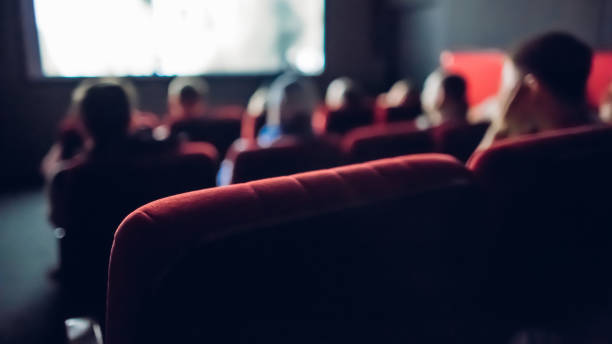Are You Feeling Cinematic Déja Vu?
Small movie theater
February 20, 2022
2021 has come and gone in what feels like no time, and with it a slew of new movies on the big screen. Last year saw the spewing of rehashed Intellectual Property (IP) all across the movie industry, but reboots specifically have been cropping up time and time again. In with the old, out with the new!
Hollywood’s 2021 line-up felt a bit like having warm nostalgia crammed down your throat. We saw remakes of old classics like Space Jam and Ghostbusters, as well as painfully self-aware meta-movies like The Matrix: Resurrections and the new Scream. Cruella added to Disney’s ever-growing mass of live-action remakes (albeit, with good music and costuming).
There were also a fair amount of sit-down reunions and documentaries to remind everyone how old they are getting. Get Back allowed a more personal look into the Beatles’ final album and specials like Friends: The Reunion and Harry Potter: Return To Hogwarts let viewers think fondly about a time when there was original content. Several notable successes emerged from the pile of reincarnated IP: Steven Spielberg’s West Side Story revitalized the classic musical with grit and authenticity, and Dennis Villeneuve’s Dune provided stunning visuals and successfully told a difficult story to put on the big screen. Even younger generations jumped on the memory lane train with reboots like iCarly, Diary of a Wimpy Kid, and Spider-Man: No Way Home, which merged 3 iterations of our favorite arachnid.
So why is Hollywood churning out a disproportionate amount of reboots, and why are we willingly giving money for more? Throughout the pandemic, we spent all of our attention and dollars on streaming, because there was nothing else to do (besides maybe make sourdough). Everyone was launched into old media, because nothing new was coming out. The social media sensation TikTok has also brought back waves of nostalgia, particularly to Generation Z. Recently, kids’ shows like The Backyardigans and Sesame Street have been massively trending. Reboots and sequels are a sure bet for cinema; people are almost guaranteed to pay to see comfy content that they already know they’ll enjoy. Even if a movie doesn’t do extremely well, there’s a safety net for the corporations who put millions of dollars into these productions. Small companies make original content, but barely create a ripple next to the tsunamis of advertising mega-corporations like Disney and Sony are putting out.
Saying that all new media is rehashed IP is exaggeration to an extent. 2021 saw the release of several original concepts in cinema. However, the highest grossing movies of the year were almost entirely based on preexisting material. Out of the top ten highest-grossing movies of the year, only one (Free Guy) was an original screenplay. Several new, exciting movies were released, but little to no marketing was attached and they passed silently by. When asked about the last foreign movie she saw in theaters, Ms. Bulk replied:
“[I saw] Rust and Bone at Theater N in 2012, but I watch foreign films on other platforms.”
Theaters seem to be a dying business; why go to a theater when someone can watch from the comfort of their own home?
Mega-companies like Marvel and its parent company, Disney, are now more IP corporations than movie studios. Marvel’s Marvel Cinematic Universe (MCU) spans years and is a cash cow for merchandise and big bucks at the box office. At this point, owning faces that moviegoers already know is more valuable than being new and exciting; the movie industry is becoming a series of power plays rather than individual strands of ideas. These are the main concepts behind projects like Disney’s new live-action lineups. Ms. O’Brien, chemistry teacher and Disney fan, said:
“My feelings are a bit of a mixed bag… Beauty and the Beast was good. I couldn’t make myself watch Aladdin because I love the Robin Williams Genie so much, even though I’m sure [Will Smith] did a great job. I also refuse to watch the Lion King because I absolutely cannot handle a real-looking lion cub sobbing over his dead dad. Mulan flopped. And then there are the new stories of old characters, like Maleficent and Cruella. The first Maleficent was good; the second one I stopped watching halfway through, and I loved Cruella.”
Encanto is up for 3 Oscar nominations this year; it’s the first time in a while that a new Disney animation isn’t “pleasant, but forgettable”. Disney seems to be putting most of its effort into reproducing all of the old characters and IP it can, so Encanto is a breath of fresh air in that regard. Still, it may be missing something in comparison to the studio’s traditional originality. O’Brien attests:
“We are a Disney house for sure; if a screen is on it most likely has something Disney playing. The old animated classics are on repeat, and the new ones are at most a single-view phenomenon.”
It seems like cinema’s regurgitation of old properties isn’t going to stop anytime soon. The coming years are set to see yet another Batman film, the long-awaited Avatar 2, a vaguely confusing Toy Story tie-in entitled Lightyear, a Chris Pratt attempt at Mario, another go at Fantastic Four, and remakes of Snow White and The Little Mermaid. And these are just the ones viewers know about!
Ultimately, when people are worried or discontent they return to what they know. We’ve been doing it naturally and Hollywood decided to capitalize on our longing for the past: it’s a safe bet for them and for us. It seems everyone is pointing to tv shows and streaming as the new frontier; hundreds of original miniseries are spilling out while theaters struggle to make revenue. Who knows where the movie industry is going? For now, let’s take a trip down memory lane.































